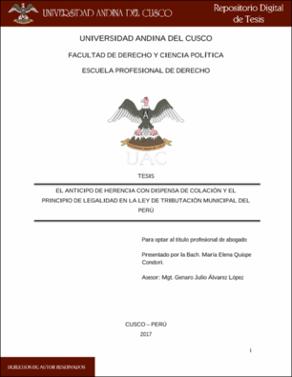| dc.contributor.advisor | Álvarez López, Genaro Julio | |
| dc.contributor.author | Quispe Condori, María Elena | |
| dc.date.accessioned | 2018-02-03T22:22:09Z | |
| dc.date.available | 2018-02-03T22:22:09Z | |
| dc.date.issued | 2017-10-23 | |
| dc.identifier.uri | https://hdl.handle.net/20.500.12557/1233 | |
| dc.description.abstract | A través de la potestad tributaria se otorgó a los Gobiernos Locales (distritales y provinciales) la posibilidad de administrar impuestos. Por ello se otorgó el Decreto Legislativo N° 776 “Ley de Tributación Municipal”, aprobado por el Decreto Supremo N° 156-2004-EF, donde establece que las municipalidades sean administradoras tributarias, dentro de la citada ley se regula el impuesto de alcabala donde el Art. 21 la define así: “El impuesto de alcabala es de realización inmediata y grava las transferencias de propiedad de bienes inmuebles urbanos o rústicos a título oneroso o gratuito, cualquiera sea su forma o modalidad, inclusive las ventas con reserva de dominio”. En este sentido el artículo 27° de la ley prescribe: “Que están inafectos del impuesto las siguientes transferencias: a) los anticipos de herencia”, existiendo una descripción genérica del supuesto no gravado, al ser confirmado en forma reiterada por el Tribunal Fiscal, problema jurídico causado por un vacío legislativo, ya que la norma es general y abstracta al no distinguir el anticipo de
herencia de aquella hecha con dispensa y su incidencia con la inafectacion del impuesto de alcabala, vulnerando el principio de legalidad. Al respecto, de acuerdo al análisis hecho en la investigación, la doctrina mayoritaria señala que la dispensa hace variar según sea el caso la naturaleza de la liberalidad, si hay dispensa será una simple donación; sino, se consideraría un adelanto de herencia o anticipo de legítima. Por lo tanto, esta distinción resulta importante desde el punto de vista tributario ya que, conforme a la ley, grava las donaciones de inmuebles mas no así los anticipos de legítima, se gravarían con el impuesto la liberalidad otorgada con dispensa, mas no así la estipulada sin ella. A través de la presente investigación se busca dar un adecuado uso de la figura jurídica del anticipo de herencia con dispensa de colación y su tratamiento legal en el ámbito tributario proponiendo la incorporación en el inc. a) del artículo 27 de la ley, la exclusión de inafectación en caso de anticipo de legítima con cláusula de dispensa, a fin de mantener la coherencia interna del ordenamiento jurídico y de premunir a los operadores del derecho de reglas claras y precisas, en pos de salvaguardar la legalidad, seguridad jurídica del sistema jurídico. | es_PE |
| dc.description.abstract | Through the tax authority, Local Governments (district and provincial) were given the possibility of administering taxes. Legislative Decree N ° 776 “Municipal Taxation Law“ was approved, approved by Supreme Decree No. 156-2004-EF, where it establishes that the municipalities are tax administrators, within the aforementioned law the alcabala tax is regulated where Art. 21 defines it as follows: “The Alcabala Tax is an immediate realization and taxes the transfer of ownership of urban or rustic real estate property for consideration or free of charge, regardless of its form or modality, including sales with domain reservation “. In this sense, article 27 of the law prescribes: “That the following
transfers are unaffected by the tax: a) advances of inheritance“, there being a generic description of the untaxed event, being confirmed repeatedly by the Tax Court, a legal problem caused by a legislative vacuum, since the rule is general and abstract in not distinguishing the advance of inheritance from the one made with exemption and its incidence with the unavailability of the alcabala tax, violating the principle of legality. In this respect, according to the analysis made in the investigation, the majority doctrine indicates that the dispensation varies according to the case the nature of the liberality, if there is dispensation will be a simple donation; if not, it would be considered an advance of inheritance or advance of legitimate. Therefore, this distinction is important from the tax point of view since, according to the law, taxing the donations of real estate but not the advances of legitimate, would be taxed with the liberality granted with dispensation, but not the tax stipulated without it. Through the present investigation it is sought to give an adequate use of the legal figure of the advance of inheritance with exemption of collation and its legal treatment in the tax field proposing the incorporation in the inc. a) of article 27 of the law, the exclusion of unauthorization in the case of a legitimate advance with a dispensation clause, in order to maintain the internal coherence of the legal system and to prioritize the operators of the right of clear and precise rules, in of safeguarding the legality, legal security of the legal system. | en_US |
| dc.description.uri | Tesis | es_PE |
| dc.format | application/pdf | es_PE |
| dc.language.iso | spa | es_PE |
| dc.publisher | Universidad Andina del Cusco | es_PE |
| dc.rights | info:eu-repo/semantics/openAccess | es_PE |
| dc.rights.uri | https://creativecommons.org/licenses/by-nc-nd/2.5/pe/ | es_PE |
| dc.source | Universidad Andina del Cusco | es_PE |
| dc.source | Repositorio Institucional - UAC | es_PE |
| dc.subject | Herencia-Anticipo | es_PE |
| dc.subject | Impuesto-Alcabala | es_PE |
| dc.subject | Dispensa | es_PE |
| dc.subject | Colación | es_PE |
| dc.title | El anticipo de herencia con dispensa de colación y el principio de legalidad en la ley de tributación municipal del Perú. | es_PE |
| dc.type | info:eu-repo/semantics/bachelorThesis | es_PE |
| thesis.degree.name | Abogada | es_PE |
| thesis.degree.grantor | Universidad Andina del Cusco. Facultad de Derecho y Ciencia Política | es_PE |
| thesis.degree.level | Titulo Profesional | es_PE |
| thesis.degree.discipline | Derecho | es_PE |


